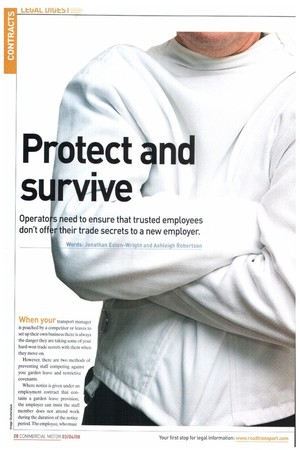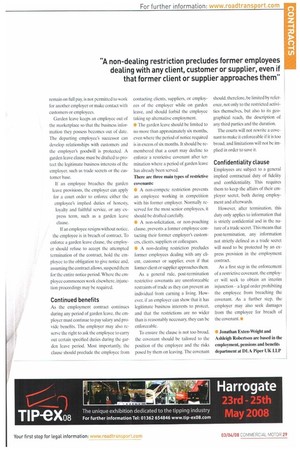Protect ond
Page 28

Page 29

If you've noticed an error in this article please click here to report it so we can fix it.
s vive
Operato s.need to ensure that trusted employees don't off heir trade secrets to a new employer.
Words: Jonathan Exten-Wright and Ashleigh Robertson When your transport manager is poached by a competitor or leaves to set up their own business there is always the danger they are taking some of your hard-won trade secrets with them when they move on.
However, there are two methods of preventing staff competing against you: garden leave and restrictive covenants.
Where notice is given under an employment contract that contains a garden leave provision, the employer can insist the staff member does not attend work during the duration of the notice period. The employee, who must remain on full pay, is not permitted to work for another employer or make contact with customers or employees.
Garden leave keeps an employee out of the marketplace so that the business information they possess becomes out of date, The departing employee's successor can develop relationships with customers and the employer's goodwill is protected. A garden leave clause must be drafted to protect the legitimate business interests of the employer, such'as trade secrets or the customer base.
If an employee breaches the garden leave provisions, the employer can apply for a court order to enforce either the employee's implied duties of honesty, loyalty and faithful service, or any express term, such as a garden leave clause.
If an employee resigns without notice.
the employee is in breach of contract. To enforce a garden leave clause, the employer should refuse to accept the attempted termination of the contract, hold the employee to the obligation to give notice and, assuming the contract allows, suspend them for the entire notice period. Where the employee commences work elsewhere, injunction proceedings may be required.
Continued benefits
As the employment contract continues during any period of garden leave, the employer must continue to pay salary and provide benefits. The employer may also reserve the right to ask the employee to carry out certain specified duties during the garden leave period. Most importantly, the clause should preclude the employee from contacting clients, suppliers, or employees of the employer while on garden Leave, and should forbid the employee taking up alternative employment.
• The garden leave should be limited to no more than approximately six months, even where the period of notice required is in excess of six months. It should be remembered that a court may decline to enforce a restrictive covenant after termination where a period of garden leave has already been served.
There are three main types of restrictive covenants: • A non-compete restriction prevents an employee working in competition with his former employer. Normally reserved for the most senior employees, it should be drafted carefully.
• A non-solicitation, or non-poaching clause, prevents a former employee contacting their former employer's customers, clients, suppliers or colleagues.
• A non-dealing restriction precludes former employees dealing with any client, customer or supplier, even if that former client or supplier approaches them.
As a general rule, post-termination restrictive covenants are unenforceable restraints of trade as they can prevent an individual from earning a living. However, if an employer can show that it has legitimate business interests to protect. and that the restrictions are no wider than is reasonably necessary, they can be enforceable.
To ensure the clause is not too broad, the covenant should be tailored to the position of the employee and the risks posed by them on leaving. The covenant should, therefore, be limited by reference, not only to the restricted activities themselves, but also to its geographical reach, the description of any third parties and the duration.
The courts will not rewrite a covenant to make it enforceable if it is too broad, and limitations will not be implied in order to save it.
Confidentiality clause
Employees are subject to a general implied contractual duty of fidelity and confidentiality. This requires them to keep the affairs of their employer secret, both during employment and afterwards.
However, after termination, this duty only applies to information that is strictly confidential and in the nature of a trade secret. This means that post-termination, any information not strictly defined as a trade secret will need to be protected by an express provision in the employment contract.
As a first step in the enforcement of a restrictive covenant, the employer will seek to obtain an interim injunction — a legal order prohibiting the employee from breaching the covenant. As a further step, the employer may also seek damages from the employee for breach of the covenant. •
















































































































































































